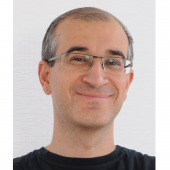Invited Speakers
-

Dr. Alptekin Temizel, Middle East Technical University, Turkey:
Biography: Alptekin Temizel Assoc. Prof., Graduate School of Informatics, Middle East Technical University (METU); currently on leave as visiting academic at Dept. of Electronic, Electrical and Systems Engineering, University of Birmingham. He received his B.Sc. in Electrical and Electronics Engineering, METU, Turkey in 1999 and his Ph.D. 2006-Centre of Vision, Speech and Signal Processing, University of Surrey, UK. He co-founded Visioprime Ltd, UK, a company developing Intelligent Video Systems for Security, where he worked as senior research engineer in 2001-2006 and acquired a number of patents. He started as an Assistant Professor at METU in 2007 where he is currently an Associate Professor. He is the principal investigator of “Virtual Reality and Computer Vision Research Group” and “GPU Education and Research Centre”. Since 2007, he collaborated with and advised several companies including Siemens EC, Havelsan Inc., TitanBT, Milsoft Software Technologies Inc., Yuksel Defence Systems on video analytics, video surveillance systems/algorithms and GPU computing. He was visiting a researcher at Microsoft MLDC-Lisbon in the summers of 2014 and 2015. He was on sabbatical leave at University of Birmingham, UK in 2016-2017. He was Area Chair of Design and Implementation of Signal Processing Systems Track of EUSIPCO (2011 and 2015), an organising member and one of the chairs of the IEEE Int. Conf. on Pervasive Services 2007 and the IEEE Signal Processing, Communication and Applications Conference (SIU) 2008. He received NVIDIA CUDA Teaching Center Award in 2010 and CUDA Research Center Award in 2012. He co-authored the papers receiving Alper Atalay Best Student Paper Award (2010 and 2011). The theses he supervised won a number of awards including METU Best Thesis Award (2011) and ISRA VISION AG - Computer Vision Award (2015 and 2016). He received Best Thesis Advisor Award, given by Prof. Dr. Mustafa N. Parlar Education and Research Foundation in 2011. He has been expert evaluator of EU H2020 and EUREKA research programs and nationally funded programs. His main research interests are video surveillance, computer vision, machine learning, GPU programming and CUDA. His recent projects include Multimodal First Person Activity Recognition (2016- ), IRIS: Towards Natural Interaction and Communication, (2014- ), Anomaly Detection for Crowded Environment Video Surveillance Applications (2012-2014), Intelligent Video Analytics Using Parallel Processing (2010-2012).
First-Person Activity Recognition with Multimodal Features:
Abstract: In typical third-person perspective videos, the camera is situated away from the actors involved in the events and the camera is not directly affected by the observed activities. On the other hand, first-person (egocentric) videos are captured using a camera on a person and reflect the first person perspective. In these videos, the observer is involved in the events and the camera undergoes large amounts of ego-motion. While many features proposed for activity recognition from third-person view can be adopted to be used in the first-person view problem, recently, new features exploiting the specific characteristics of the first-person problems have also been proposed. In addition, as the camera is directly involved in the activities, other features extracted from different modalities such as audio can also be used together with the video based features. On the other hand, different features have varying recognition performances and some features might have redundant information. In this talk, I will first summarise the current state-of-the-art on first person activity recognition. Then I will discuss several different features and provide a comparative assessment of their performance for first person activity recognition.

